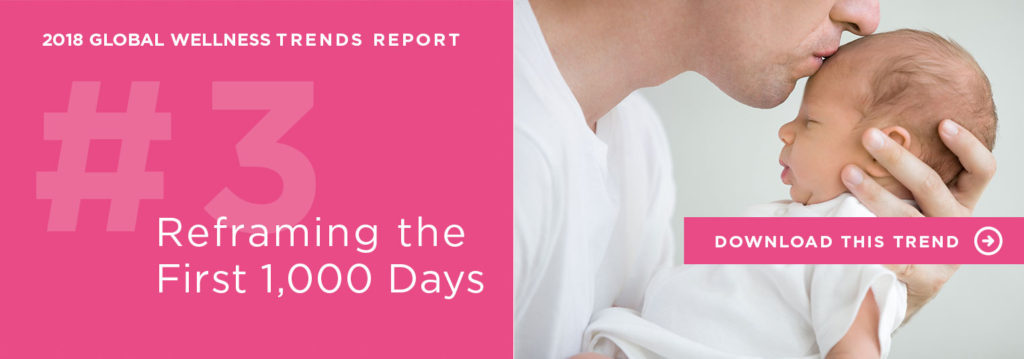Reframing the First 1,000 Days
Pre-conception & paternity enter the health equation
First, let’s do the math. “The first 1,000 days” traditionally refers to 270 days of pregnancy, plus the first two years of a child’s life (730 days). However, this trend report also looks at the health and lifestyle of the mother and the father during the six months (180 days) before they conceive a baby. It all adds up to 1,180 days– and a new way of looking at the factors that determine a child’s future health.
For decades, medical researchers have studied how a mother’s lifestyle, such as what she eats and drinks during pregnancy, can impact the health of her child. The negative effect of toxic substances on the developing baby, such as alcohol, nicotine, drugs, and environmental toxins, have also received ample attention. In addition, researchers have examined how diet affects the nutritional quality of a mother’s breast milk. And there have been numerous studies that link nutrition in infancy and early childhood to differences in health outcomes, both in the short and long term. There has even been a range of studies on how touching–or lack of touching–can affect a baby’s development.
The medical evidence gleaned from this research has informed the advice given by medical doctors and wellness professionals to mothers for many years.
However, the impact of the parents’ lifestyle on a baby’s long-term health and intellectual development during the preconception period has received far less attention. In addition, in a mom-centric world, the health of the father’s sperm–and his part in creating a supportive and healthy environment – has been, for all practical purposes, ignored. Given that so many people write and speak about the importance of disease prevention, the absence of looking at health and wellness during the pre-conception period and the role of the father is notable.

Begin at the Beginning…and Before
However, a new perspective was on the agenda at the 2017 Global Wellness Summit. Dr. Sergio Pecorelli, MD, PhD, an academic and surgeon at the University of Brescia Italy, challenged delegates to look before the traditional 1,000 days and recognize that the health of both parents during the preconception period, including their emotional wellness, can impact their child’s health for a lifetime. In other words: It’s time to acknowledge that it takes two people to make a baby, and the health of the sperm when conception occurs, as well as the father’s lifestyle during the pregnancy and beyond, is as important as the mother’s ovum and lifestyle.
This new trend puts sharp focus on the role of epigenetics, which is the study of changes in gene function that can be inherited but do not change the underlying DNA sequence. We also explore how environmental and lifestyle factors, along with emotional and social stresses, can alter a baby’s development during preconception, pregnancy and the first two years.
In other words, the world is finally recognizing how lifestyle choices can help or harm the genomes and health of an individual for his or her lifetime.
The trend also examines how parents are turning to the same wellness therapies and techniques that have improved their own lives, in order to add wellness to their children’s formative years. Equipped with more knowledge and resources than in the past, these wellness-focused moms and dads recognize that they can set the stage for a healthier life by teaching their children healthy habits at an early age.
It’s not surprising, that this new trend is also becoming a booming industry. Healthy treatments and programs, from baby yoga classes to organic baby food to relaxing “baby moon” pre-conception getaways, will be a growth factor in spa and wellness for years to come.
FUELING THE TREND
There is increased awareness that non-communicable chronic disease, such as diabetes and heart conditions, is responsible for 99% of all disease and that preventative measures, including exercise, nutrition, massage, and meditation, can be the most powerful antidotes to ill health.
Discussing emotional wellness and mental health is less taboo. There is greater recognition that a mother and father’s stress levels, along with conditions like anxiety and depression during pre-conception, pregnancy and after the birth, can negatively impact a baby’s physical health for a lifetime. For instance, a stressful environment can cause lasting health problems in a child, such as attention deficit issues, depression, anxiety, and ADS.
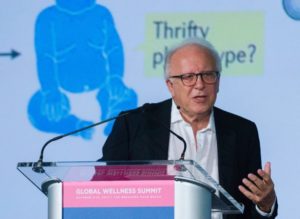
Telomeres are the protective caps of our chromosomes and a window to overall health. Elizabeth Blackburn, AC FRS FAA FRSN, compares telomeres to the plastic tip at the end of a shoelace. Blackburn co-discovered telomerase, an enzyme that can add DNA to telomeres to slow, prevent and partially reverse shortening. In an article in The Guardian, she points out that managing chronic stress, exercising, eating better and getting enough sleep can maintain telomere health. For this study, Blackburn was awarded the 2009 Nobel Prize in Physiology or Medicine, sharing it with Carol W. Greider and Jack W. Szostak.
In 2017, Dr. Elissa Epel, PhD, a professor at the University of California, San Francisco, School of Medicine, co-authored “The Telomere Effect: The New Science of Living Younger Longer” with Elizabeth Blackburn. Epel spoke at the 2017 Global Wellness Summit on the future of telomeres.
Since the initial study, there has been a dramatic increase in telomere testing and more recognition of the wide-ranging health implications of telomere length. In fact, telomere-testing companies are airing commercials on mainstream television.
For example, a study of 100,000 patients, conducted by Kaiser Permanente, the University of California, San Francisco, and National Institutes of Health, found that subjects with short telomeres had a significantly higher risk of death in the three-year, follow-up period. Furthermore, behaviors like smoking and heavy alcohol consumption were associated with shorter telomeres, while moderate exercise was linked with longer ones. While this study was conducted with adults, there are obvious implications for children and babies.
If a mother has an unhealthy diet, the quality of her breast milk may not contain sufficient protein and other essential nutrients. Researchers are now taking a fresh look at how the mother’s nutrition, along with environmental toxins such as air pollution, can impact the term of her pregnancy as well as her child’s development.
The explosion of “mommy” (and daddy) blogs, along with parenting websites devoted to pregnancy and raising healthy children, has created an army of informed, connected, wellness-savvy parents open to new ideas. It is also fair to say that there is a good deal misinformation on the Internet, given the number of blogs and “experts.” Therefore, medical evidence for wellness modalities, such as the studies archived on WellnessEvidence.com, are becoming a crucial tool.
Aspects of the Trend
Pre-Conception: The Months Before Pregnancy: 180 Days
As mentioned earlier, during his presentation at the 2017 Summit, Dr. Pecorelli made a strong case that disease prevention begins before a baby is conceived. “We don’t know the moment when people will decide or not decide to have a baby–this can last 20 years or 20 minutes! However, we do know that the father’s spermatozoa lasts 90 days within the testes. And in those 90 days a lot of things can happen.”
The science of epigenetics explains why a healthy lifestyle is important during this period. According to Clinical Epigenetic, while epigenetic change is a natural occurrence influenced by factors such as age, the environment, lifestyle, and existing diseases also play a part. In other words, lifestyle choices can help or harm the genomes and health of an individual for his or her lifetime.
Many researchers also believe these environmental agents or experiences influence human heredity, and these modifications to genomes can be transmitted to offspring. It is startling to realize that “…. susceptibility to common diseases appearing during a lifetime can be the result of a gene-environment interaction that occurred in one parent of a subject, not in the subject himself.”
For example, it is possible that both paternal and maternal obesity could contribute to the inheritance of an obesity syndrome in their offspring. Obese fathers could transmit epigenetic markers on genes that regulate brain development and appetite control that could predispose a child to obesity.
In summary, exercise, a healthy diet, sleep, and meditation can be an effective therapeutic strategy to prevent dysfunctional epigenetic programing. But an unhealthy lifestyle could affect the epigenome of reproductive cells and have an unprecedented effect on the health of future generations, thus influencing the offspring’s health and disease risk.
Other medical experts at the 2017 Summit, including Dr. Andrew Weil, Dr. Dean Ornish, Dr. Kenneth Pelletier, and Dr. Michael Roizen, underscored this thesis.
And Paul Limburg, M.D., a gastroenterologist at the Mayo Clinic and member of the 2017 Global Wellness Summit DNA and Biomarker Panel, noted, “…while a person’s genetic blueprint is fixed, gene expression is influenced by multiple different factors, including epigenetics, and the expression of that gene can change dramatically based on the factors that (were) mentioned.”
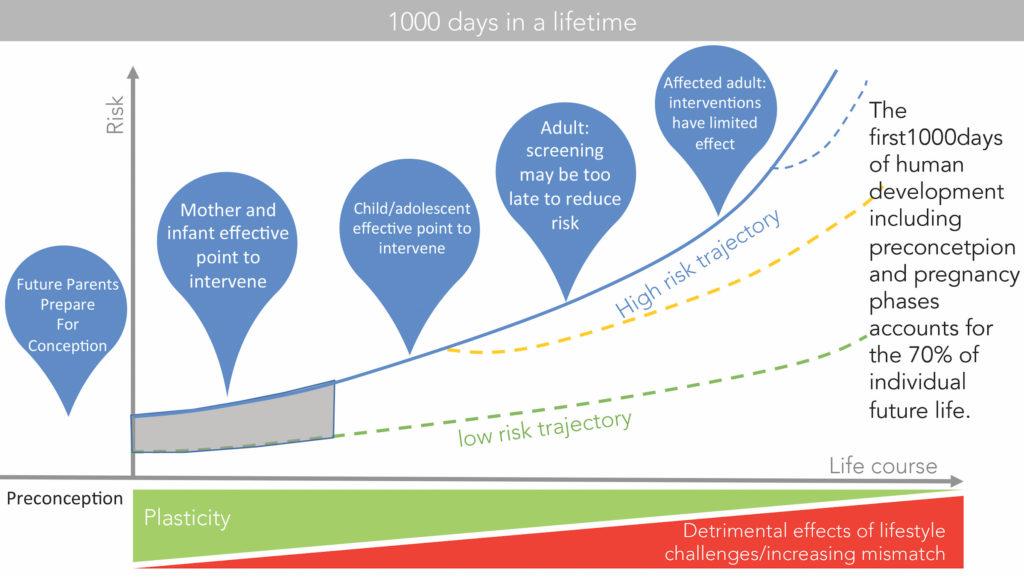
Pregnancy: 270 Days
Nearly every woman who sees a health professional during her pregnancy is told to “eat healthy, exercise, and avoid smoking and alcohol.” The idea is to prevent harm to the baby and protect the mother’s health. But what part does the father play? Is his job done when his sperm fertilizes the egg? Or do his diet and lifestyle choices continue to be important? And can trauma that occurs during pregnancy–or even during childhood–be transmitted to offspring?
Foods that moms and dads eat before conception, and what the family eats during pregnancy, can impact the child’s health for a lifetime and for generations to come. This is an even more serious concern in a world where an estimated 795 million people do not have enough food to lead a healthy active life (about one in nine people on earth).
A Closer Look at Stress
As the audience for parenting websites and blogs continue to grow, editors have developed unique insights into the concerns of a new generation of parents. Danielle Campoamor of Romper.com, a website for millennial moms, reports that the number of women who want to discuss emotional issues, such as depression, is rapidly increasing.
“A parent can be stressed for all kinds of reasons: financial, lack of support or healthcare, depression, or job-related. Too often the parents’ emotional and mental health are overlooked, and the child can suffer as well.”
Campoamor notes that mental wellness issues can develop anytime before, during, or after a pregnancy, and lack of support from the father (or other family members) can often be a factor. “It’s popular to say: ‘It takes a village to raise a child,’ but until systematic support is available on a cultural level, moms are too often on their own.”
The New York Times reports that a new study of 46,877 Finnish children found “…daughters of women exposed to childhood trauma are at increased risk for serious psychiatric disorders.” The study’s lead author, Torsten Santavirta, an associate professor of economics at Uppsala University, said, “The most important takeaway is that childhood trauma can be passed on to offspring.”
The March of Dimes also cautions that too much stress during pregnancy can impact the baby’s health and lead to conditions like high blood pressure, which can cause premature weight. That stress can cause development problems, such as attention deficit issues and anxiety.
The Telomere Tie-In
In her keynote presentation at the 2017 Global Wellness Summit, Elisa Epela, PhD affirmed that there has been a dramatic increase in telomere testing and more awareness of the wide-ranging health implications of telomere length.
“Pregnancy and childhood are critical periods that shape our telomeres and rate of cell aging for life…and pregnancy will be a huge window into public health programs of the future. Childhood adversity, and during especially pregnancy, leave scars on telomeres and can have lasting effects on the mother’s health as well as her offspring’s.”
This is where dads and the broader society come in. Dr. Pecorelli reminds us that environment can mean a number of things: our own lifestyle, who we live with, and social stressors. “These stressors include the life we live with our family, the life we live with our partner, the life we live with our children, and the life we live in the place we work. Any of those could be stressful.”
And stress can lead to harmful epigenetic changes that can be passed to our children.
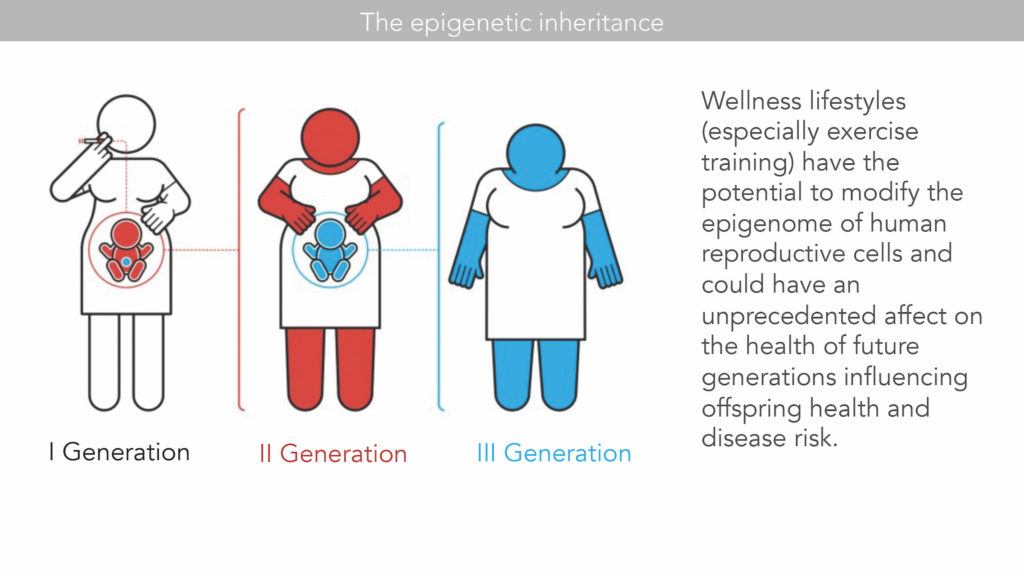
Infancy to Two Years: 730 Days
Thanks to those aforementioned blogs, websites, generations of articles on child-raising, and lots of good old-fashioned advice from friends and family, people around the world know that it is important to feed their children healthy food, help them learn how to manage stress, and encourage exercise. And if we are fortunate, we have the means and time to do so. Much has been written about the benefits of wellness practices but three mini-trends stand out.
The Organic Trend Keeps Trending
There is an explosion in the global demand for organic foods, grass-fed beef and cage-free eggs. Therefore, it’s not surprising that parents are concerned about feeding their babies produce that contains pesticides and meat, poultry, and dairy containing antibiotics–not to mention high sodium, high sugar, and high fat junk food. This concern is spreading to the $55 billion global baby food market (dominated by mega-food giants) and there is a growing demand for affordable organic baby food that is not processed with chemicals and preservatives.7
One example is Little Spoon, an organic, baby food company with a tagline that states, “Your baby food shouldn’t be older than your baby.” Hipp Organics in the United Kingdom is another example of the vast number of boutique brands marketing organic baby foods. And the big retailers, such as Gerber’s, UK-based Planet Organic, and U.S.-based Whole Foods have all jumped on the organic baby food bandwagon, contributing to a global market that is forecast to reach $11.1 billion by 2023, growing at a rate of 10.6% compound annual growth rate during the forecast period.
In Europe and other parts of the world, a more natural food supply is readily available for adults and children. However, as the global marketing of “fast” and processed foods continues to explode – think McDonald’s “Golden Arches” brand in China – demand for organic food retailers will continue to trend.
Healthy Guts: Baby Sized
Gut health has attracted the attention of wellness-minded consumers, so it is not surprising that probiotics designed for infants are also gaining in popularity. Proponents say a baby’s intestines needs a proper balance of beneficial bacteria and yeast and that these microflora play an important role in combating pathogenic viruses and bacteria. Microflora are also said to help babies digest milk and develop a healthy “gut,” avoiding allergies and more serious developmental disorders. Yogurt with probiotics is a popular food for young children, and many baby cereals are now fortified with probiotics to support digestive system health.
The Power of Massage
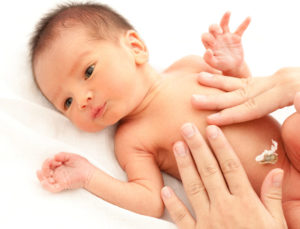
A report published on MarchOfDimes.org explains that preterm birth is now the single most important cause of neonatal deaths (babies under 28 days) and the second leading cause of death in children under age five. The data is based on estimates in 184 countries, which were aggregated by Born Too Soon. A number of factors contribute to premature births, including air pollution. (India and China have the highest number of pre-term births.) But the good news is that in controlled studies conducted around the world, there is greater weight gain in preterm newborns that received moderate pressure massage therapy.
Tiffany Field, PhD, Director of the Touch Institute at the University of Miami, pioneered the science of touch. She explained her groundbreaking study on the use of massage on premature babies to delegates at the 2017 Summit.
“Our research–and the research of hundreds around the world–found that if you massage premature babies twice a day, for 10 days, they will gain 47% more weight and be discharged from the hospital six days earlier. The cost benefit analysis, shows $4.8 trillion savings in hospital costs.”
In addition, a study conducted by a research team at the University of British Columbia, Canada, showed that the amount of contact received by babies can affect them at the molecular level, and these effects can last for years. According to the study, which was published in Development and Psychopathology, babies who received less physical contact and are more distressed at a young age may experience epigenetic changes that affect gene expression.
Parents are also turning to massage for babies with normal birth weights, as well as toddlers, publications like Parents Magazine provide complete instructions. In a related article, Field explains massage stimulates the babies’ central nervous systems and causes their brains to produce more serotonin, a feel-good chemical, and less cortisol, which is related to stress.

The Future
As more research demonstrating the positive impact of wellness modalities is released, we expect medical and health practitioners to adapt new guidelines that go beyond “no smoking or alcohol during pregnancy.” And these guidelines will include dads as well as moms.
We also predict that more medical professionals will recommend wellness treatments and techniques, such as yoga and mindfulness, for moms, dads, and babies. For instance, massage will be the first choice to treat babies and children of all ages suffering from injury, sleeplessness or pain.
Baby monitors are old news, but also expect to see more technology that focuses on the mother, rather than the baby. One current example is Willow, a digital breast pump that tucks neatly in a bra and tracks the amount of milk collected, the collection date, and the length of each pumping session. We think in the future, digital pumps will also measure the quality of the breast milk, including protein levels and toxins–a development that could improve the health of babies worldwide.
Group exercise classes like Stroller Strides®, a total-body workout for moms and dads with kids in tow, while entertaining little ones with songs and activities, will continue to increase in popularity. Mommy (and daddy) and baby yoga classes will also become more mainstream.
And let’s not forget where we began this trend: new meaningful research. As mentioned above, research on the first 1,000 days is moving from a narrower, “What-should-mom-eat?” focus to a serious look at how both parents will influence a child’s health–before conception, in pregnancy and in childhood– for a lifetime.
An ambitious three year study under the direction of Dr. Pecorelli and a global team of scientists and clinicians will examine how the first days of human development, including preconception and pregnancy, can impact up to 70% of an individual’s lifetime health.
Researchers involved with the project will collect pregnancy-related samples and data from parents and children from near conception to about two years of life. This database will create a resource that will support future investigations and examine associations between prenatal exposures, genetic susceptibility, or physiological changes in pregnancy. (Giovanni Lorenzini Medical Foundation, Milan and New York, support the research project, with initial funding by the Brescia Industrial Association.)
Philip J. Landrigan, MD, MSc, FAAP, Dean for Global Health and Professor of Environmental Medicine, Public Health and Pediatrics, Arnhold Institute for Global Health, Icahn School of Medicine at Mount Sinai–and an advisor to the study– said that the goal is to bank samples from research subjects and develop a platform that will support a range of future studies. He went on to say:
“The bottom line is that we do not know enough about early pregnancy. This longitudinal research will measure variables such as diet, exercise, stress and other early wellness interventions. The ultimate goal of this landmark study is to discover the environmental causes of health and disease in children and turn those discoveries into a prescription for lifelong good health.”
Endnotes:
UNICEF, “The First 1,000 Days of Life: The Brain’s Window of Opportunity,” Sarah Cusick, PhD and Michael K. Georgieff, MD
US National Library of Medicine National Institutes of Health “Infant Nutrition and Later Health: A Review of Current Evidence,” Siân Robinson* and Caroline Fall, August 2012
The Guardian, “Elizabeth Blackburn on the telomere effect: ‘It’s about keeping healthier for longer,’ Zoë Corbyn, January 2017
Clinical Epigenetics, “Epigenetics and male reproduction: the consequences of paternal lifestyle on fertility, embryo development, and children lifetime health,” Liborio Stuppia, Marica Franzago, Patrizia Ballerini, Valentina Gatta and Ivana Antonucci, 2015
Ibid
New York Times, “Trauma May Have Fallout Over Generations,” Nicholas Bakalar, November 20, 2017
CNBC, July 2015
Research & Markets, “Global Organic Baby Food Market Analysis (2017-2023)” September 2017
BodyEcology.com, “How, Why, and When to Introduce Babies to Probiotics”
National Institute of Health, “Preterm Infant Massage Therapy Research: A Review,” 2010
Parents Magazine, “The Benefits of Baby Massage,” Nancy Gottesman
Science Alert, “Babies Who Get More Cuddles Have Their Genetics Changed For Years, Study Shows,” David Nield, November 29, 2017
Copyright © 2017-2018 by Global Wellness Summit.
If you cite ideas and information in this report please credit “2018 Wellness Trends, from Global Wellness Summit”.
For more information, email beth.mcgroarty@www.globalwellnesssummit.com.
